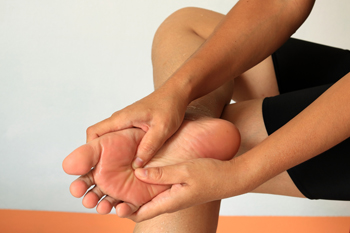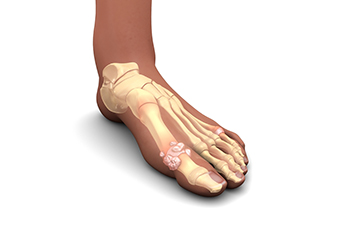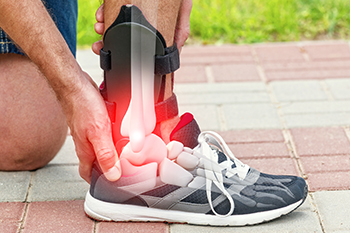Items filtered by date: August 2024
Complications From Diabetic Neuropathy

Diabetic neuropathy, particularly affecting the feet, is a serious concern for those with diabetes. Over time, high blood sugar can cause nerve damage, leading to sensations such as burning, tingling, or even stabbing pain in the feet. However, as the disease progresses, it often results in numbness, making it difficult for diabetic patients to notice injuries like cuts, blisters, or sores. Without the ability to feel pain, their injuries can go unnoticed and untreated, potentially leading to severe complications like infections, ulcers, or even gangrene. In extreme cases, tissue removal or amputation may be necessary. Regular inspections and early detection of cuts, blisters, or open sores on your foot are vital to prevent these outcomes. A podiatrist plays a key role in managing diabetic neuropathy by identifying such issues early, providing treatment, and advising on proper foot care. If you have foot pain that may be linked to neuropathy, it is suggested that you schedule an appointment with a podiatrist for an exam and treatment.
Neuropathy
Neuropathy can be a potentially serious condition, especially if it is left undiagnosed. If you have any concerns that you may be experiencing nerve loss in your feet, consult with one of our podiatrists from Florida Ankle & Foot Institute. Our doctors will assess your condition and provide you with quality foot and ankle treatment for neuropathy.
What Is Neuropathy?
Neuropathy is a condition that leads to damage to the nerves in the body. Peripheral neuropathy, or neuropathy that affects your peripheral nervous system, usually occurs in the feet. Neuropathy can be triggered by a number of different causes. Such causes include diabetes, infections, cancers, disorders, and toxic substances.
Symptoms of Neuropathy Include:
- Numbness
- Sensation loss
- Prickling and tingling sensations
- Throbbing, freezing, burning pains
- Muscle weakness
Those with diabetes are at serious risk due to being unable to feel an ulcer on their feet. Diabetics usually also suffer from poor blood circulation. This can lead to the wound not healing, infections occurring, and the limb may have to be amputated.
Treatment
To treat neuropathy in the foot, podiatrists will first diagnose the cause of the neuropathy. Figuring out the underlying cause of the neuropathy will allow the podiatrist to prescribe the best treatment, whether it be caused by diabetes, toxic substance exposure, infection, etc. If the nerve has not died, then it’s possible that sensation may be able to return to the foot.
Pain medication may be issued for pain. Electrical nerve stimulation can be used to stimulate nerves. If the neuropathy is caused from pressure on the nerves, then surgery may be necessary.
If you have any questions, please feel free to contact our offices located in Tavernier, Marathon, and Key West, FL . We offer the newest diagnostic and treatment technologies for all your foot care needs.
Keep Your Feet Healthy So You Can Stay Active
What Are Gout Tophi?

Gout is a type of arthritis caused by a buildup of uric acid in the bloodstream. This acid can crystallize and become lodged in the joints of the feet, particularly the big toe, leading to sudden and intense pain, swelling, and inflammation. Gout typically flares up and then goes away, only to flare up again. It can become a chronic condition if measures are not taken to prevent future flare-ups. Chronic gout can cause large, visible bumps, called tophi, to form in bones, joints, or cartilage. Tophi are made of urate crystals and are usually not painful unless they become infected or press on a nerve. But although they’re not painful in and of themselves, tophi are problematic because they can damage joints, destroy cartilage, and eventually lead to bone erosion, deformity, and disability. For more information about gout, it is suggested you consult with a podiatrist.
Gout is a painful condition that can be treated. If you are seeking treatment, contact one of our podiatrists from Florida Ankle & Foot Institute. Our doctors will treat your foot and ankle needs.
What Is Gout?
Gout is a form of arthritis that is characterized by sudden, severe attacks of pain, redness, and tenderness in the joints. The condition usually affects the joint at the base of the big toe. A gout attack can occur at any random time, such as the middle of the night while you are asleep.
Symptoms
- Intense Joint Pain - Usually around the large joint of your big toe, and it most severe within the first four to twelve hours
- Lingering Discomfort - Joint discomfort may last from a few days to a few weeks
- Inflammation and Redness -Affected joints may become swollen, tender, warm and red
- Limited Range of Motion - May experience a decrease in joint mobility
Risk Factors
- Genetics - If family members have gout, you’re more likely to have it
- Medications - Diuretic medications can raise uric acid levels
- Gender/Age - Gout is more common in men until the age of 60. It is believed that estrogen protects women until that point
- Diet - Eating red meat and shellfish increases your risk
- Alcohol - Having more than two alcoholic drinks per day increases your risk
- Obesity - Obese people are at a higher risk for gout
Prior to visiting your podiatrist to receive treatment for gout, there are a few things you should do beforehand. If you have gout you should write down your symptoms--including when they started and how often you experience them, important medical information you may have, and any questions you may have. Writing down these three things will help your podiatrist in assessing your specific situation so that he or she may provide the best route of treatment for you.
If you have any questions, please feel free to contact our offices located in Tavernier, Marathon, and Key West, FL . We offer the newest diagnostic and treatment technologies for all your foot care needs.
Foot Orthoses
 A foot orthosis, with the plural being orthoses, is a medical device inserted into shoes to correct foot problems by redistributing pressure and providing support. These devices function by adhering to tissue stress principles, which aim to reduce stress and strain on tissues within the foot, alleviating pain and promoting healing. Orthoses are used for various foot conditions, such as plantar fasciitis, Achilles tendinopathy, and midfoot osteoarthritis. Foot orthoses work by aligning the foot and ankle into a more biomechanically efficient position, thus reducing abnormal motion and pressure on specific areas. They can be either prefabricated or custom-made. Prefabricated orthoses are mass-produced and available off the shelf, offering a general fit and support. Custom-made orthoses, however, are specifically designed to match an individual's unique foot structure and condition, providing a higher level of precision and effectiveness. Proper prescription and fitting of orthoses are imperative for achieving the desired therapeutic outcomes. If you have foot pain that persists, it is suggested that you consult a podiatrist for an accurate diagnosis and to see if orthotics can help you.
A foot orthosis, with the plural being orthoses, is a medical device inserted into shoes to correct foot problems by redistributing pressure and providing support. These devices function by adhering to tissue stress principles, which aim to reduce stress and strain on tissues within the foot, alleviating pain and promoting healing. Orthoses are used for various foot conditions, such as plantar fasciitis, Achilles tendinopathy, and midfoot osteoarthritis. Foot orthoses work by aligning the foot and ankle into a more biomechanically efficient position, thus reducing abnormal motion and pressure on specific areas. They can be either prefabricated or custom-made. Prefabricated orthoses are mass-produced and available off the shelf, offering a general fit and support. Custom-made orthoses, however, are specifically designed to match an individual's unique foot structure and condition, providing a higher level of precision and effectiveness. Proper prescription and fitting of orthoses are imperative for achieving the desired therapeutic outcomes. If you have foot pain that persists, it is suggested that you consult a podiatrist for an accurate diagnosis and to see if orthotics can help you.
If you are having discomfort in your feet and would like to try orthotics, contact one of our podiatrists from Florida Ankle & Foot Institute. Our doctors can provide the care you need to keep you pain-free and on your feet.
What Are Orthotics?
Orthotics are inserts you can place into your shoes to help with a variety of foot problems such as flat feet or foot pain. Orthotics provide relief and comfort for minor foot and heel pain but can’t correct serious biomechanical problems in your feet.
Over-the-Counter Inserts
Orthotics come in a wide variety of over-the-counter inserts that are used to treat foot pain, heel pain, and minor problems. For example, arch supports can be inserted into your shoes to help correct overarched or flat feet, while gel insoles are often used because they provide comfort and relief from foot and heel pain by alleviating pressure.
Prescription Orthotics
If over-the-counter inserts don’t work for you or if you have a more severe foot concern, it is possible to have your podiatrist prescribe custom orthotics. These high-quality inserts are designed to treat problems such as abnormal motion, plantar fasciitis, and severe forms of heel pain. They can even be used to help patients suffering from diabetes by treating foot ulcers and painful calluses and are usually molded to your feet individually, which allows them to provide full support and comfort.
If you are experiencing minor to severe foot or heel pain, it’s recommended to speak with your podiatrist about the possibilities of using orthotics. A podiatrist can determine which type of orthotic is right for you and allow you to take the first steps towards being pain-free.
If you have any questions please contact our offices located in Tavernier, Marathon, and Key West, FL . We offer the newest diagnostic and treatment technologies for all your foot and ankle needs.
Shin Splints and the Feet
 Shin splints, medically known as medial tibial stress syndrome, are a common condition resulting in pain along the inner edge of the shinbone, or tibia. This pain typically results from repetitive stress on the shinbone and the connective tissues that attach muscles to the bone from the ankle. Runners, dancers, and athletes who engage in high-impact activities are particularly at risk. The condition often occurs due to overuse, wearing improper footwear, or sudden increases in physical activity. Flat feet or abnormally high arches can worsen shin splints by causing improper alignment and distribution of stress during movement. Treatment for shin splints includes rest and anti-inflammatory medications to reduce pain and swelling. Stretching and strengthening exercises, along with wearing proper footwear, can prevent recurrence. A podiatrist can provide valuable assistance by evaluating your foot biomechanics and recommending custom orthotics to improve alignment and reduce stress on the tibia. If you have shin splints, it is suggested that you schedule an appointment with this type of doctor for care.
Shin splints, medically known as medial tibial stress syndrome, are a common condition resulting in pain along the inner edge of the shinbone, or tibia. This pain typically results from repetitive stress on the shinbone and the connective tissues that attach muscles to the bone from the ankle. Runners, dancers, and athletes who engage in high-impact activities are particularly at risk. The condition often occurs due to overuse, wearing improper footwear, or sudden increases in physical activity. Flat feet or abnormally high arches can worsen shin splints by causing improper alignment and distribution of stress during movement. Treatment for shin splints includes rest and anti-inflammatory medications to reduce pain and swelling. Stretching and strengthening exercises, along with wearing proper footwear, can prevent recurrence. A podiatrist can provide valuable assistance by evaluating your foot biomechanics and recommending custom orthotics to improve alignment and reduce stress on the tibia. If you have shin splints, it is suggested that you schedule an appointment with this type of doctor for care.
Ankle and foot injuries are common among athletes and in many sports. They can be caused by several problems and may be potentially serious. If you are feeling pain or think you were injured in a sporting event or when exercising, consult with one of our podiatrists from Florida Ankle & Foot Institute. Our doctors will assess your condition and provide you with quality foot and ankle treatment.
Common Injuries
The most common injuries that occur in sporting activities include:
- Achilles Tendonitis
- Achilles Tendon Rupture
- Ankle Sprains
- Broken Foot
- Plantar Fasciitis
- Stress Fractures
- Turf Toe
Symptoms
Symptoms vary depending upon the injury and in some cases, there may be no symptoms at all. However, in most cases, some form of symptom is experienced. Pain, aching, burning, bruising, tenderness, tightness or stiffness, sensation loss, difficulty moving, and swelling are the most common symptoms.
Treatment
Just as symptoms vary depending upon the injury, so do treatment options. A common treatment method is known as the RICE method. This method involves rest, applying ice, compression and elevating the afflicted foot or ankle. If the injury appears to be more serious, surgery might be required, such as arthroscopic or reconstructive surgery. Lastly, rehabilitation or therapy might be needed to gain full functionality in the afflicted area. Any discomfort experienced by an athlete must be evaluated by a licensed, reputable medical professional.
If you have any questions, please feel free to contact our offices located in Tavernier, Marathon, and Key West, FL . We offer the newest diagnostic and treatment technologies for all your foot care needs.




